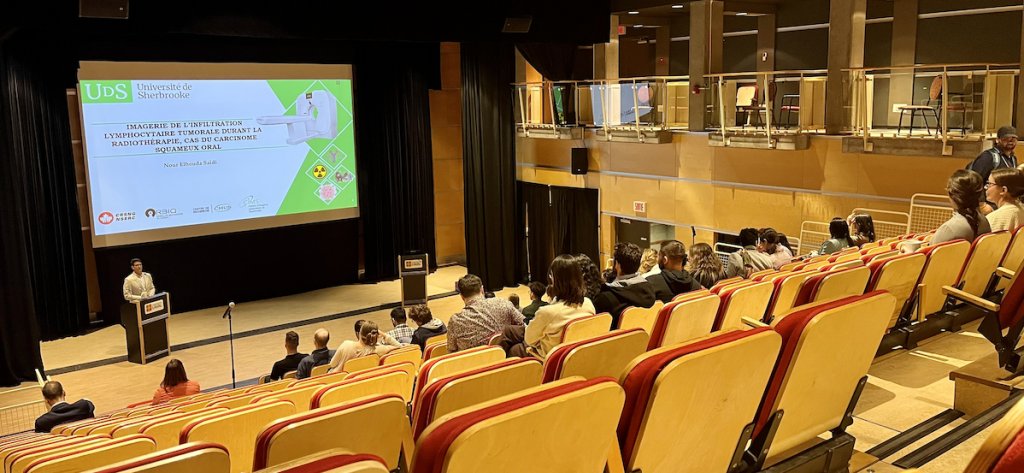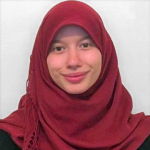At the conclusion of this year’s scientific day, attendees gathered for a cocktail reception to network and discuss their research. I was able to interview a few participants, capturing their insights on the event. Additionally, I took this opportunity to inquire about their own experiences and gather valuable advice for aspiring young research students. Read on to get a glimpse of some of the remarks shared during these conversations!
Q1. Which part of this Scientific Day did you find most fascinating?
When asked about the most fascinating part of the Scientific Day, interviewees mentioned various aspects that underscored the significance of conferences as platforms for sharing and learning about the latest advancements in the field.
Prof. St-Onge, an early career researcher at l’Université du Québec en Outaouais, expressed his appreciation for the collaborative nature of the event, stating, “I truly valued the variety of people’s expertise and how their collaborative work helps advance biomedical imaging research. It was especially inspiring to witness the presenters’ motivation about their various projects.” This observation highlights the significance of passion and motivation in driving meaningful discoveries within the field of biomedical imaging. Prof. St-Onge also emphasized the multifaceted nature of the bioimaging field, which requires striking a balance between specificity within a niche subfield and exploring other relevant areas. This intricate yet essential balance can be achieved through collaborative efforts, where teams come together, engage in discussions, and understand the importance of their respective contributions within the larger project. Furthermore, effective communication of research findings plays a crucial role in enhancing our understanding of how to best address research questions. It is imperative to present findings clearly and concisely, ensuring that the vital aspects of niche and technical projects are accessible to the wider scientific community.
Valerie Brisson, a PhD student at Université Laval, found the complexity and multifactorial nature of human diseases discussed during the conference to be the most fascinating aspect. She stressed the importance of multimodality in gaining a deeper understanding of these diseases. Valerie expressed her genuine excitement about the advancements in imaging tools, as they are increasingly detailed and precise. She particularly highlighted the ability to use these tools in combination to view various features of a disease or condition from different angles: : “It’s exciting to see how imaging tools are becoming more precise and are increasingly used together to examine diseases from different angles”. This integrated approach of studying diseases showcases the exciting progress being made in the field of biomedical imaging.
Louis-Daniel Gaulin, one of our student flash talk prize winners, expressed his enthusiasm for the variety of the findings showcased during the conference. He also emphasized the importance of multimodality in the research field and how prevalent this notion was across the presentations. Louis-Daniel found the groundbreaking use of ultrasonic microscopy to assess cerebral blood pulsatility particularly intriguing, as this innovative tool was not commonly discussed in neuroscientific studies, unlike the more well-known MRI and PET techniques. The flash talks provided valuable insights into utilizing established techniques in novel and innovative ways, opening up new avenues for research. If you missed any of these talks, we invite you to delve into the abstracts of this year’s flash presentations by clicking here.
Q2. If you could go back in time, which advice would you give to your younger self?
As we were wrapping up the interview, I posed a final question to each of the interviewees: what advice would they give their younger self? The responses I received were diverse, yet complementary. They provided perspectives that resonated with me on a personal level.
“One thing that is important is to be relatively versatile in your field of research,” advised Louis-Daniel. He underlined the significance of maintaining a diverse skill set and exploring other disciplines that may be relevant to your area of expertise. Louis-Daniel’s insights align with his own experience, he further shared, “I had the tendency to stay in the same domain… while it is a good thing to be good in what you’re doing, it’s important to keep in mind that other disciplines can be relevant to your field, remain versatile!” Alongside this critical advice, Louis-Daniel highlighted the endurance required during the pursuit of a master’s degree: “A MSc is not a sprint, it’s a marathon!“, stressing the need to manage one’s energy throughout the duration of the program to prevent burnout. Moreover, he emphasized the positive impact of a supportive work environment, which can help researchers overcome challenges and rediscover the joy of their research endeavors. Sometimes, all we need is to be reminded of why we are doing what we are doing, and to know that we are well supported throughout.
Valerie’s advice highlights the importance of self-reflection and goal-setting. She encourages us to allocate time to truly comprehend our desires: “First, take the time to explore and understand your true passions, then create a clear plan to pursue them.” She emphasized that having a well-defined vision of what we want to achieve fuels our motivation. This rings true because a clear goal inspires us to take the necessary steps to make it a reality. In a nutshell, Valerie’s advice urges us to identify our passions and chart a path toward our aspirations to maintain unwavering motivation along the way.
Prof. St-Onge’s advice centered on the importance of finding a middle ground between considering future outcomes and maintaining a positive outlook. He acknowledged the natural tendency to take our future into account when making present decisions but cautioned against excessive worry and adopting a pessimistic mindset about what lay ahead. As he shared, “It is important to ensure that what you are doing in the present is meaningful and adds value to your life. As you progress, you will gain a better understanding of your preferences and what you truly enjoy pursuing… Sometimes, the problem is that we overworry about a future outcome and decide to play it safe instead of taking the leap.” His key point is to make well-informed choices in the present moment, taking into consideration our goals and aspirations, and once those decisions are made, to let go of any lingering regrets or doubts about their outcomes. In essence, he encouraged us to be proactive and thoughtful in our decision-making, without allowing the fear of regret to overshadow our progress and hinder our ability to embrace new opportunities.
After concluding the Scientific Day, I had an insightful conversation with Prof. Simon Duchesne. In passing, he generously shared two valuable pieces of advice which I thought could prove insightful for fellow students, as they seem to hold significant meaning. The first advice may initially seem paradoxical: “Do not listen to anyone’s advice, including this one“. However, it carries a profound message, particularly for young researchers who may be more easily influenced by academic pressure, including from established faculty members. It emphasizes the importance of thinking for oneself and considering your personal interests and priorities, as no one else is in the exact same position that you are – and therefore, what works for others may not work for you. Prof. Duchesne’s second advice encourages us to prioritize our personal interests without succumbing to the fear of missing out on opportunities: “Find and put your interest first; opportunities will keep coming“. This reminds us to align our decisions with our passions and goals, rather than being swayed by external pressures; one should carefully evaluate research opportunities in this light. Passion in academia seems a necessary armor against the inevitable hardships that this exalting but demanding career provides. These insights serve as a valuable reminder for young researchers to maintain autonomy, make independent decisions, and stay true to their own aspirations while still appreciating the perspectives and guidance of others.
Thank you to all the interviewees for sharing their valuable insights with me!
Louis-Daniel Gaulin, MSc student, Université de Sherbrooke; Valérie Brisson, PhD student, Université Laval; Prof. Etienne St-Onge, PhD, Université du Québec en Outaouais; Prof. Simon Duchesne, Ph.D, Université Laval.
Ikrame is a Master's student in Biomedical Engineering at the Université de Montréal. Her current work centres around investigating the relationship between MRI- detected cerebrovascular pathology, cerebrovascular architecture, and age-related dementias. Ikrame's passion for scientific research extends beyond bench work, as scientific communication has been integral to her research involvements. Making science accessible to the general audience is crucial, and she believes that knowledge translation is key to achieving this goal and hopes to contribute to this effort.



